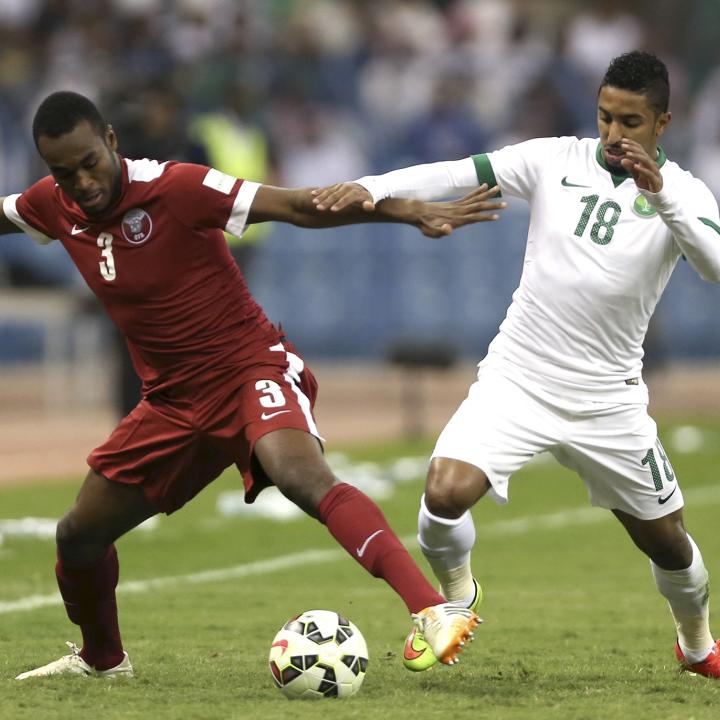

Nearly two years after Gulf neighbors put a splint on their diplomatic fracture with Doha, persistent tensions and historic quarrels will form a major part of the competition’s backdrop.
For Gulf-focused diplomats and analysts, even those who don’t normally watch soccer, the Qatar World Cup is set to offer a fascinating glimpse into the state of local politics when it kicks off on November 20. The headline match in regional terms is arguably the United States vs. Iran on November 29, but the main question is whether the competition will be a win for Qatar or a disastrous and very public example of overreach.
Framing the context is the 2017-2021 period when Saudi Arabia, the United Arab Emirates, Bahrain, and Egypt imposed a diplomatic and commercial blockade on Qatar for a litany of complaints, including support for the Muslim Brotherhood and ties to Iran. Yet many of their tensions go back generations and have been exacerbated by differing geological fortunes.
In Qatar’s case, the tiny nation with a citizen population of around 300,000 has found itself sitting on the third-largest natural gas reserves in the world—more than Saudi Arabia and the UAE, and dwarfing the paltry hydrocarbon assets of nearby Bahrain. Further complicating the picture, most of Qatar’s gas lies offshore in a giant field shared with Iran.
Competitive tensions on the soccer field could prove significant as well, since the sport is watched obsessively by Gulf populations and heavily invested in by their leaders. Saudi Arabia’s sovereign wealth fund bought the British team Newcastle United in 2021; a brother of Emirati president Muhammad bin Zayed (aka MbZ) owns Manchester City; and the Dubai-based airline Emirates sponsors the London club Arsenal. These teams currently occupy the top three places in the English Premier League; in addition, Emir Tamim of Qatar owns the prominent French team Paris Saint-Germain. The rivalries between these clubs will only raise the competitive tension during the World Cup, where many of their players will serve key roles on national squads (the Saudi and Qatari national teams will appear in the tournament; Tunisia and Morocco are the only other Arab countries that qualified).
The glare of this regional and global spotlight may be withering. Qatar has already faced waves of mostly negative media coverage on numerous issues, including its treatment of the immigrant workers who built the tournament’s infrastructure, the circumstances under which it won the rights to host the competition in the first place, and its less than progressive stance on LGBTQ rights. Although much of this criticism is deserved, its dramatic increase in volume may be more attributable to historical rivals seizing the opportunity to take shots at Qatar rather than Doha committing substantially worse abuses than its neighbors. Under the terms of the 2021 agreement ending the Gulf rift, hostile media coverage is prohibited, but it is widely assumed that the UAE and Bahrain—whom Riyadh coerced into accepting the truce—have been boosting the negative news stories. Yet none of the Gulf states has an unblemished record on ameliorating oppressive conditions for imported construction workers. According to a November 11 Financial Times article, “NGOs and trade unions hope that Qatar’s reforms will have ‘demonstrative impact’ on the whole Gulf region with its exploitative labour practices...The biggest fish is Saudi Arabia, while the United Arab Emirates is ‘probably the most intransigent of the Gulf countries on labour issues.’”
As for the tournament itself, aside from the U.S. match against Iran, perhaps the main spectator sport for non-fan analysts will be spotting which Gulf leaders show up in person. Saudi crown prince Muhammad bin Salman—who last year abruptly decided that the Qatar rift had gone on long enough—is a probable attendee, while Emirati leader MbZ seems less likely. Bahraini leaders are unlikely to participate either, though a junior royal or two may show. Whoever turns up, the final match will not take place until December 18, so regional diplomacy could be in for a tense few weeks.
Simon Henderson is the Baker Fellow and director of the Bernstein Program on Gulf and Energy Policy at The Washington Institute.



